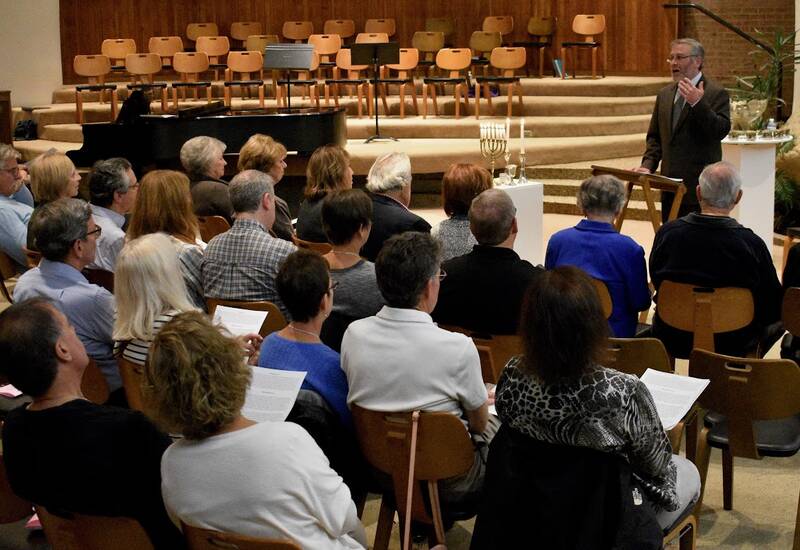Humanistic Judaism

6 Ways Humanistic Judaism is Different
from Other Branches of Judaism
1. It is a non-theistic, secular form of Judaism that rejects the idea of an omnipotent God who intervenes in people’s lives.
2. Instead of praying to a supernatural being, Humanistic Jews rely on reason, science, and critical thinking.
3. While Humanistic Judaism retains many of the traditional Jewish holidays and lifecycle events, it interprets them in a secular and cultural context rather than a religious one. For example, a Humanistic Shabbat service includes candle-lighting and wine, but the blessings emphasize our appreciation for light and the human effort that produced the wine rather than gratitude to a supernatural being.
4. Humanistic Judaism places a strong emphasis on building community and fostering a sense of shared values and culture, but encourages independent, critical thinking. We like to say we are a collection of “like-minded people who don’t think alike.”
5. Humanistic Jewish services focus on the parts of Jewish history, culture and literature that are relevant to our lives in the world today without feeling obligated to include traditional prayers and readings we don’t believe in. We say what we mean and mean what we say.
6. Humanistic Judaism provides a comfortable home for individuals and families who identify as Culturally Jewish, Just Jewish, Jew-ish, Jewish and . . . , Half-Jewish, Interfaith, Jews by Choice, Not Religious, Secular, Humanistic, Atheist, and/or Agnostic. Kol Hadash is also home to multicultural, interfaith, LGBTQIA+ and non-traditional families. No prior knowledge or Jewish literacy is needed; come as you are!
Humanistic Judaism FAQs
1. How can a person be Jewish without a firm belief in God?
Being Jewish is not a function of belief; it is a function of identification, connection, and personal meaning. In fact, in the 2013 Pew Research Center study of American Jews, more than two-thirds of the respondents said being Jewish is mainly a matter of ancestry and culture rather than religion. Think of it this way: are Adam Sandler and Amy Schumer Jewish? Of course. Do they believe in god? We have no idea, and more importantly, we don't need to answer the second question to answer the first.
2. Do Humanistic Jews Celebrate the traditional Jewish holidays?
Yes. Humanistic Jews celebrate the major Jewish holidays replacing prayer with inspirational and thought-provoking prose, poetry, and music. We celebrate the historic, human, and natural bases for Jewish holidays and mark the passages of life with ceremonies that reflect both Jewish culture and our Humanistic values.
3. If there’s no prayer, what happens at a Kol Hadash service?
Our rabbi leads Shabbat and holiday services by adapting familiar Jewish traditions to be consistent with our secular philosophy. We use materials that encourage reflection and meditation while resonating with our Jewish cultural heritage. We sing Jewish songs in English, Hebrew, and Yiddish – always providing translations and transliterations (pronunciation in English letters).
4. What do you teach your children about Judaism?
For us, the purpose of Youth Education is to educate, not indoctrinate. Our Sunday School students explore the entire range of the Jewish experience and are encouraged to think critically and decide for themselves what Being Jewish and Doing Jewish means to them.
5. How do you answer children’s questions concerning the concept, figure, and importance of “God”?
Rabbi Adam Chalom addresses this question in a short essay with six questions and answers. The essay has two answers to each question, one aimed at children under age 7, and the other aimed at children between ages 8 and 12. Dealing with the “God” Question.
6. Are there other Jewish Humanistic Congregations?
Yes! Humanistic Judaism was founded in 1963 by Rabbi Sherwin Wine, and has become an international Jewish movement. We are a member of the umbrella organization, the Society for Humanistic Judaism, which has more than 10,000 members in 30 congregations throughout North America.
7. Who are your leaders and how are they trained?
Our congregational leaders are rabbis and lay leaders who have been trained in Humanistic Jewish philosophy and practice by the International Institute for Humanistic Judaism (IISHJ). These leaders perform lifecycle events, lead services, and provide guidance and support to members of the community.
